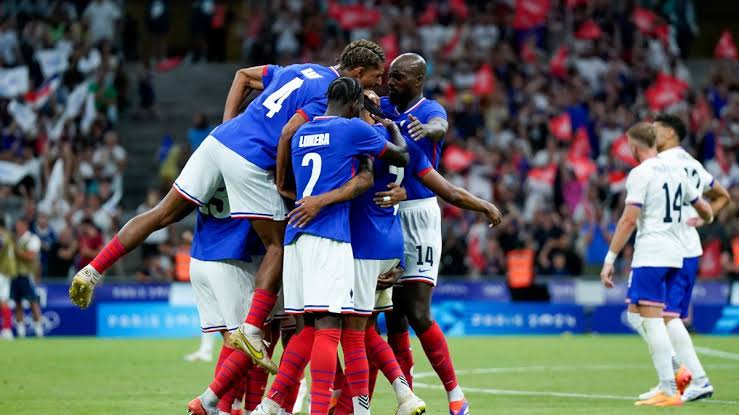In football, there is no greater honor than winning the FIFA World Cup, but there is also the opportunity to win an Olympic gold medal.
Aspiring footballers have traditionally looked to the Olympic competition as a way to display their skills and launch their careers to new heights.
The Olympics provide a once-in-a-lifetime opportunity for athletes to get world-class training, exposure, and recognition in the most prestigious athletic event in the world.
Many athletes consider their Olympic run a watershed event in their careers, ushering new opportunities with elite clubs, more notoriety, and rich sponsorship agreements.
READ MORE – Olympic Football Legacy
Taking part in the Olympic competition allows athletes to compete against the world’s top young talent, putting their abilities and resilience under intense scrutiny.
Scouts, coaches, and fans may all take notice of a spectacular performance, which can open doors to further chances.
The Olympics also provide an opportunity to hone qualities that elite clubs and coaches highly prize: mental toughness, discipline, and teamwork.
Numerous footballers have used their Olympic experience to reach greatness, demonstrating the importance of the competition on players’ careers.
The Olympics have been the springboard for careers beyond sports, for historical icons like Pelé and Romário and contemporary sensations like Neymar and Sergio Ramos.
The next crop of football stars will be looking to emulate their heroes and make the most of the Olympic platform to further their careers.
Table of Contents
Men’s football at the Olympics is one of the competitions with an age limit

As of the 1992 Barcelona Games, athletes must be 23 years old or younger to compete in the Olympics.
However, beginning in 1996 Atlanta, teams may include up to three players who were 24 years old or older on their rosters.
Although men’s football’s FIFA World Cup is esteemed, the Olympics have an entirely different allure and significance.
Every country has a chance to win
After starting in Uruguay in 1930, Russia hosted the 21st World Cup in 2018. It is the most prestigious athletic tournament in the world, second only in importance to the Olympic Games, although only eight nations have ever triumphed.
Germany (including West Germany) and Brazil (with five championships), Italy (with four), France (with two), England (with one), and Argentina (with one) are the following best after Brazil.
Because of their history of success and widespread enthusiasm for the sport, these eight countries are among the most revered traditional football powers.
Traditional powers make it harder for a rising nation to progress in championships as the rankings rise.
France beat Croatia in the 2018 FIFA World Cup final, marking Croatia’s first-ever appearance in the tournament.
What matters is having a track record of success in previous events. The World Cup is beautiful because of it.
In contrast, men’s football did not occur in the 1932 Summer Olympics in Los Angeles, but it debuted at the 1900 Paris Games—30 years before the first World Cup—and has since had 19 winning nations in 26 games.
Three teams—England and Hungary—have won many times, while Argentina, the Soviet Union (now Russia), and Uruguay have each won twice.
With five World Cup victories under their belts, Brazil finally took home the trophy in Rio 2016.
Teams from Africa, such as Cameroon in 2000 and Nigeria in 1996, have dominated the quest for gold in previous tournaments.
Conversely, Mexico has never advanced beyond the quarterfinals in a World Cup (London 2012).
A significant event that shapes the lives of young players
The Olympic Games provide a platform for young athletes aged 23 and under to showcase their talents to an international audience.
In addition to competing fiercely for spots with larger clubs, players battle for national pride and glory.
Young players’ careers are greatly influenced by their performance in international events, a crucial assessment indicator.
Not only have players like Neymar (Brazil), who won silver in 2012 in London and gold in 2016, and Lionel Messi (Argentina), who won gold in 2008 in Beijing, returned with medals to their home countries.
Stars like Cristiano Ronaldo (Portugal) and Ronaldinho (Brazil) who competed in the Olympics in 2004 in Athens and 2000 respectively have gone on to tremendously successful careers.
No European team has won Olympic gold since Barcelona in 1992; many attribute this to the UEFA European Championship.
Due to club ambitions, young players competing in the UEFA European Championship in June and July in the same year as the Olympic Games sometimes opt out of competing in the Games.
Different countries have different situations that prevent certain players from being called up, but this compromise is tough for European teams.
How to use the extra places
The addition of the extra spots makes picking a winner much more challenging.
From the first use of this system in Atlanta in 1996 to the Sydney 2000 Games, the players in these positions have done what was expected of them.
Patrick M’Boma, who had shown his exceptional goal-scoring abilities in the J.League, scored four goals and guided Cameroon to its first-ever championship win.
Neymar became the first player to win the title in Rio 2016, surpassing all expectations.
Final Note
Ultimately, the Olympic football tournament is a game-changer for players’ careers, providing an arena for development, publicity, and acclaim.
Athletes may reach new heights with a successful Olympic campaign, gaining notoriety, sponsorship deals, and top-tier club offers.
The success tales of both past and present players attest to the tournament’s illuminating heritage of cultivating vital abilities in a highly competitive setting.
As long as the Olympics keep showcasing up-and-coming athletes, they will always be a watershed moment for ambitious players to make a name for themselves, maybe even changing their careers forever.
The Olympics are a watershed moment in each athlete’s career as they have carried on making an impact at another global event.